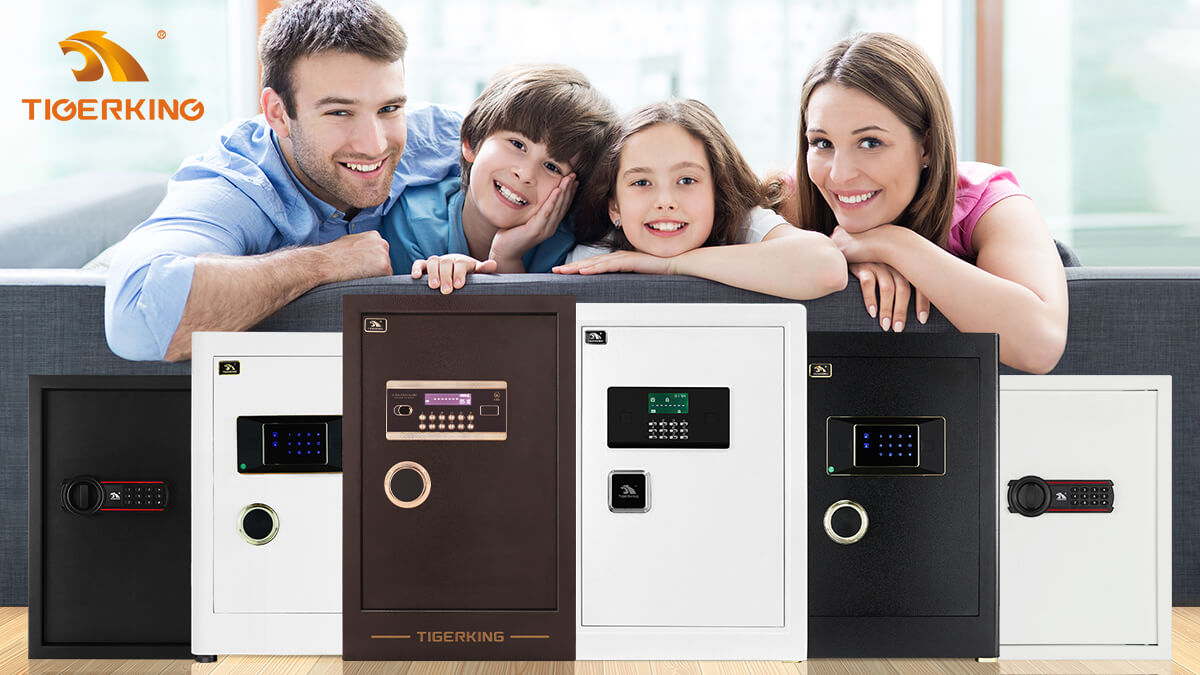Within the wide world of safe boxes, every kind meets a particular need: wall safes provide covert security for areas with limited space; traditional safety deposit boxes in banks offer high security with restricted access. Choosing the best safes for home or office, come in a variety of sizes and lock options. In this article, we'll explore different types of safe boxes together, helping select the best safe boxes for you.
Home Safe Boxes
A home safe is necessary for storing valuables and important documents at home. They come in a variety of shapes, each tailored to certain requirements and preferences. The following is a summary of the main common home safe types and their characteristics.
Gun safes:
Made to keep weapons safe from unwanted access, particularly from kids and other family members, these are intended to be used to store firearms. They range in size from compact handgun safes to substantial rifle cabinets. Numerous gun safes can be mounted in a variety of ways for convenience and concealment, and many provide rapid access in case of need.
Pistol safes:
Pistol safes are typically smaller and designed specifically for handguns. They are compact and often portable, making them suitable for small spaces or travel. Gun safes, on the other hand, are larger and built to accommodate rifles, shotguns, and multiple firearms. These are more suitable for stationary storage.
Jewelry Safes:
Usually equipped with strong locking systems and velvet lining inside to protect delicate objects from scratches, jewelry safes are perfect for keeping priceless jewels, heirlooms, or emotional artifacts. Some types come with fireproofing, and they are frequently made with shelves or drawers for simple organization.
Portable safes:
Portable safe, a compact mobile safe, which is suitable for those people who need to protect their belongings on their trip. They often feature carrying handles and are designed to withstand fire. But, they offer less security than permanent safes and are better suited for the short-term storage of little goods like jewels and cash.
Commercial Safe Boxes
Choosing the appropriate commercial safe box is a key decision for enterprise, since it involves protecting sensitive data and valuable assets, meanwhile, protecting the secure working environment. Here's a summary of the things to think about and the different kinds of commercial safes that are out there:
Depository safes:
They allow money or papers to be deposited without opening the main entrance, making them perfect for organizations that deal with a lot of cash transactions.
Floor Safes:
Perfect for high-value objects, these are installed straight into the floor.
Wall Safes:
right into walls, these safes offer discreet and secure storage.
Stand-Alone Safes:
Freestanding devices with extra security that are fastened to the ground
Cash Safes:
Specifically intended for enterprises handling big sums of cash.
Pharmacy safes:
Designed to protect medicine in the medical environment and restrict substances.
Biometric, Keypad, and Combination Safes
In securing valuables, biometrics, keypads, and combination safes offer tailored solutions to meet diverse security needs. Each type of safe brings its unique strengths to the forefront, providing a range of options for personal and professional security requirements.
Biometric Safes:
Utilize fingerprint recognition for quick, personalized access, eliminating the need for keys or remembering codes. Ideal for both personal and professional environments where swift access is essential.
Keypad Safes:
Feature a numeric keypad for entry, allowing users to set custom access codes. This keyless option combines ease of use with secure access, suitable for various settings.
Combination Safes:
Rely on a mechanical sequence of numbers for unlocking, offering a reliable and traditional method of security without dependence on electronic components.
Fireproof and Waterproof Safe Boxes
Waterproof and fireproof safe boxes are vital to protect valuables in extreme conditions. These safe boxes can provide extra security in the event of a fire or flood to make sure that your valuables, data, and important files are safe. Here's a closer look at their features and benefits:
Fireproof Safes:
These safes are designed to resist extreme temperatures which are suitable for storing important files and valuables in the event of a fire. They are rated based on how long they can endure the heat without harming their contents.
Waterproof Safes:
These safes protect against water damage, crucial for safeguarding items from floods or water leaks. They include watertight sealing to keep the contents dry.
Considerations for Choosing Fireproof and Waterproof Safes:
Evaluating Your Needs:
The particular objects you want to keep secure should guide your safe selection. Paper papers, for example, are more prone to damage at low temperatures than digital data.
Size and Location:
Consider the amount of space available and where you want to place the safe. Safes vary in a wide range of shapes and sizes, from little chests to massive floor models.
Budget and Quality:
Make sure your spending plan aligns with the degree of security you need. Although they cost more, higher-end models frequently provide superior protection.
In the end, learning safe boxes is vital to satisfy your needs and preferences. Making the appropriate choice can make sure your valuables are secure and give you peace of mind. Don’t wait for security! Discover the best safe box for your home or business. Click here to explore our top picks and safeguard your valuables now!








Share:
Concealed Protection: The Secret to Safeguarding Your Valuables with a Hidden Fireplace Safe
Defend Your Money In Fire: What Is The Best Fireproof Safe For Home Use?